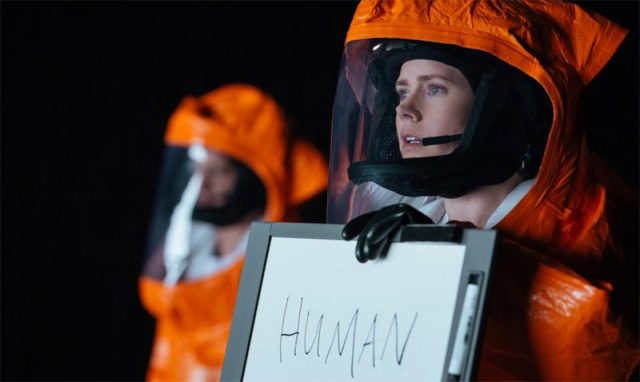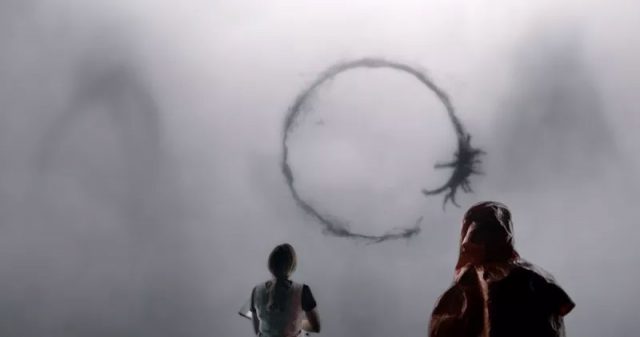This is what truly happens when you pick a rising Hollywood leading man, and pair him with an equally capable rising Hollywood leading woman, and put them in a sci-fi movie.
No, this is not the marketing ploy that is the film Passengers. Arrival, which stars Amy Adams and Jeremy Renner is the smarter film, filled with better writing, an out of this world but far more sensible plot, two charming leads and an intelligent ending that makes viewers yearn for more.
Unfortunately, the Hollywood machinations cannot market anything beyond genres, or the dashing beauty of its leads, but Arrival is more than just another typical alien movie.
Louise Banks (Amy Adams) is a linguist called forth to decipher alien language belonging to visitors who arrive on earth in 12 spacecraft that appear across the planet. Independence Day this is not, so no one attacks the ships, and the aliens don’t annihilate the planet.
There is no invasion fleet or politicking at play within the movie, and Louise simply wants to communicate with the aliens, and find out why she is having visions about her dying daughter.
But aliens and language? In a make believe Hollywood film with aliens? How?
The link appears tenuous at first, especially if (a) you haven’t read Ted Chiang’s “Story Of Your Life”, the film’s short story source material, or if (b) you are not a fan of the humanities. Simply put, Arrival conveys a discourse of understanding, something which is missing in modern America, and in inter-faith/religious/race relationships right now.
In our real world, we often take language for granted. We use it in everyday speech, in writing and even in thought, so much so that communication no longer becomes a wonder, the way quantum physics is to the layperson.
Take for example the word 湿市场. It has no meaning to Chinese Singaporeans. To the Chinese in other parts of the world, it literally means “wet market”. But over here, we use the term 巴刹 to mean the market and even the wet market. 巴刹 is an appropriation of the Malay word Pasar, so the form of communication stems from the evolution of cultures in one country. Now imagine approaching a language that has no common denominators.
This fundamental rift in approaching the world is what sparks off the first meeting between Dr Banks and teammate-slash-physicist Ian Donnelly (Jeremy Renner), and continues to make its presence felt for the rest of the story.
But the way in which the invisible mechanics of language shapes the way we communicate is precisely what Chiang uses to build up to the ‘Oh Sh*t’ moment of his short story, and also what director Denis Villeneuve does a spectacular job of bringing to life.
In one scene, Colonel Weber (Forest Whitaker) demands that Dr Banks ask the aliens the big question: “What is your purpose here?” The problem – as Banks explains – is that the aliens must even know what a question is to begin with. Or the concept of intent. And all that, assuming they even understand the English alphabet.
Now you see what we mean when we say this is not your typical alien movie?
In another geeky scene that would surely satisfy linguists, the Sapir-Whorf hypothesis is mentioned. This theory postulates that the structure of the language you use highly influences the way you think. Though it has been greatly debated amongst real-world researchers, this concept is indeed key to the film’s plot. This mention therefore not only demonstrates another aspect of the film’s attention to detail in its adaptation, it is also a nod to what is often a highly misunderstood academic field.
In mainstream society, the field of linguistics is often played as an afterthought. And this real-world misunderstanding plays out in the interactions of Dr Banks and Donnelly as well. Renner performs his role to stereotypical perfection – flirty, condescending, and smugly rational. On the other hand, Adams’ turn as a quietly impassioned academic who buries herself neck-deep in work is refreshing. Watching the two interact is like watching linguistics professionals finally get their hard-earned vindication. And between their deductions and conversations, the chemistry is palpable: Villeneuve makes each moment as intimate as it is groundbreaking.
Maybe it is not enough to have a leading male and female lead. Perhaps the involvement of Villeneuve is required. The up and coming French-Canadian director did the impressive Sicario, and is also behind the highly anticipated Blade Runner 2049 later this year, and he clearly knows his way around a well-written script.
Accurate depictions of technicalities aside, Villeneuve and composer Jóhann Jóhannsson have teamed up to create a score that also hits all the right notes. The strings crescendo at key moments, bringing home that feeling of your heart palpitating, palms sweating, that endless ringing in your ears. It is as hauntingly magnificent as that first time you laid eyes on the massive spacecraft, and eerily reminiscent of the heptapods and their strange beauty. The music, indeed, is as otherworldly as the heptapods’ own language.
For all the film’s merits, there is but one cringe-worthy flaw: the unnecessary portrayal of China as a pseudo-antagonist. Chiang’s intimate story has been blown up onscreen to become a high-stakes, international crisis involving key political players. Dr Banks, caught amidst all this crossfire, is expected to grapple with a newfound discovery and save the world all at once. It is almost unbelievable.
But Chiang approves of the adaptation. He calls it “both a good movie and a good adaptation” and said, “And when you consider the track record of adaptations of written science fiction, that’s almost literally a miracle.”
So maybe we can’t decipher alien languages the way Dr Banks does. But we can work first with the languages we already: translating from paper to screen.
GEEK REVIEW SCORE
Overall
8.5/10-
Story - 8/10
8/10
-
Direction - 9/10
9/10
-
Characterisation - 8.5/10
8.5/10
-
Geek Satisfaction - 8.5/10
8.5/10


















